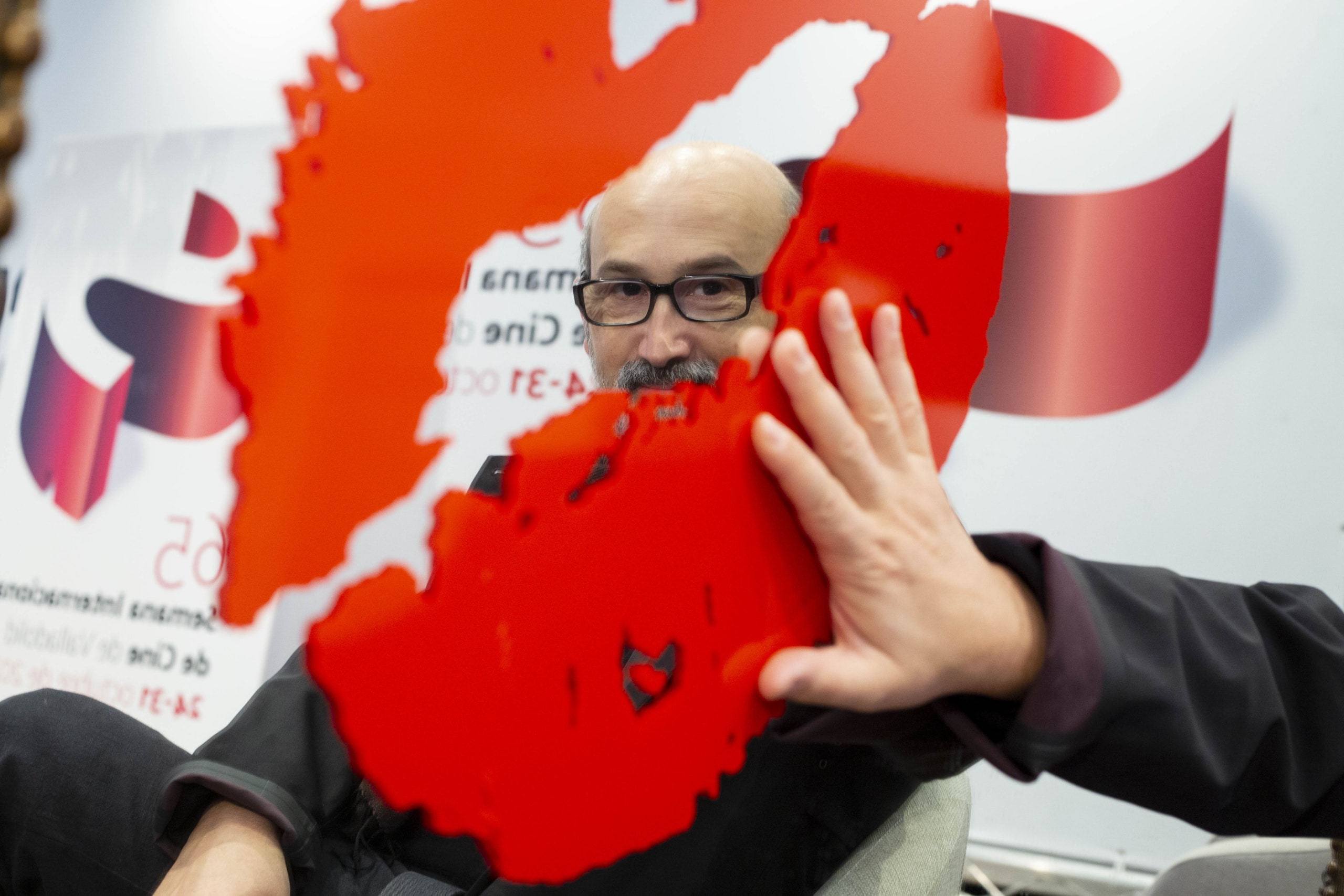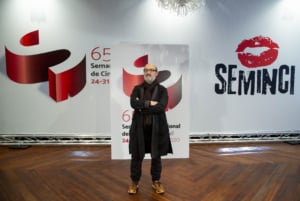
- The actor delivered the first of the two master classes scheduled at the 65th edition of Seminci
10/27/2020.- The Rioja-born actor Javier Cámara delivered this Tuesday the first of the two master classes scheduled at the 65th edition of Seminci, which later today will present him with an Honorary Spike. In his address, Cámara admitted that his experience has led him to realize that on many occasions people are not aware that they are already prepared for certain things; it’s s the others who make you realise that this is so.
That was precisely what happened to him when he received a call from Pedro Almodóvar inviting him to join the cast of Talk to Her. “There are very beautiful things that happen to you in life, and there are people who see it all before you do, and you only realise later. Sometimes we do not know that we are already prepared for certain things. When Almodóvar offered me the role, I called him and told him that I just couldn’t play that part, to which he replied that he knew I could. You see, I read the script and thought: “I am light years away from this!”
This happened while he was playing a lead role in the popular comedy show Siete Vidas: a success he never imagined he could achieve, according to his own confession. “I never saw myself doing films: never (…). I never dreamed of cinema or television,” admitted the performer, who in his early days used to believe that you could only study to become a stage actor and that cinema and television were “like a kind of aristocracy that one could only aspire to join if one had family connections “.
Nothing could be further from reality: television, and specifically that comedy show, became the best springboard in his acting career. Even today he retains a strong emotional attachment to that job: “TV is fabulous by itself. There are so many things to do on TV… I always want to go back there “. Of course: only if the product is good and appeals to him professionally, as happened with his later TV part in Vamos, Juan.
Re-learning to play on stage
Something similar happens with his stage acting jobs: he really wants to go back to stage playing and he knows he will, but in this case he admits to experiencing a certain wariness, because the stage requires a re-training, learning to play differently from playing in front of the camera, where the acting style tends to be more restrained. “It took me a lot to learn that, and I will have to re-learn how to play in the theatre,” he confessed before adding another comment on his ‘acting fears’: “the curtain rises every day, so that each performance is a new beginning”.
In his conversation with the Valladolid fest director Javier Angulo, Cámara spoke about his early steps in the profession and the career path he eventually followed, as well as sharing with the online audience his memories and preoccupations. Javier left his hometown, Albelda de Iregua, because he felt “stifled” there and because Archaeology, which was the subject he wanted to study, was really at odds with his father’s expectations, who wanted him to follow in his footsteps as a farmer.

“It was difficult for me to find out that what I wanted to be in the world was this, I would never have imagined it.” Eventually Cámara left Albelda and headed for Madrid, where, in order not to waste a whole year, he enrolled at the Royal High School of Dramatic Art. He had already taken his first acting steps in the theatre group of his Vocational University and although he had never dreamed of becoming an artist, he realized that this was his professional calling when he saw Jose Luis Alonso de Santos directing an actor and when, suddenly , he realized that he could easily study acting because he related so well to the director’s explanations.
In order to support himself in Madrid, Cámara worked was an usher at the Fígaro Theater (“is there anything better for an apprentice actor than working as an usher in a theater?”); he also worked as a waiter at the Film Archive. Even so, those training years “went by like a flash”, while new opportunities came soon. His jobs as a screen actor afforded him a great deal of learning and a lot of experience. And although his background training is important, he explained that he always looks for references elsewhere whenever he has to play a role: “a way of walking, a perfume … Every character is an entirely different world”. Of course, easy is not always best: “the more alien the character looks, the deeper you need dig inside yourself. When you understand the character well, you learn little … but with a character who is very far away from you, you tell yourself: well, I can be inside there too “.
Cámara has also learned to let himself be carried away by the stories he plays, whether they be comedies or dramas. In this way, he is able to get a lot of enjoyment from his parts, to ” breathe along with the character”.
Corpses on the table
One of the most emotional moments he recalled during his master class originated with ‘Truman’, a film where he played alongside Ricardo Darín, “an exemplary actor. He’s such a funny guy, so human, so sensitive, so fragile … so discreet … it was a very beautiful thing.” Even today, he remembers in detail that first meeting with him in the presence of the film’s director, Cesc Gay. Since Darín was travelling from Argentina and Cesc from Barcelona, Cámara offered his home for rehearsals. He made coffee and when they sat down, Darín invited them to put “the corpses on the table.” “My father had passed away many years ago and I had to face a movie about loss.” So Darín began to explain the reasons why he was making the film… “Those were two hours of delightful conversation: the three of us talked without restrictions about our dead and about all kinds of stories that we could put on the table… and suddenly I said: this is how it should be before every film shot “.
“Humanity is a great lesson.” This is one of the things the actor has learned. After working with the greatest, Cámara has come to understand that directors do not always have a clear view of things; sometimes the expect the actors to have it, so they can go about their business. On the other hand the actor-director relationship is based on trust. The performer recalled how Almodóvar feeds the actor with the minutest details. “He is thorough, passionate, and above all he falls in love with his actors and actresses.” Isabel Coixet, under whose direction he has worked on several occasions and whom Seminci has also presented with one of its Honorary Spikes this year, is “a very special woman” who “is entirely self-made: a force of nature “.
Despite his huge success, the “impostor syndrome”, that is, the fear of being discovered sooner or later as a fraud, has never quite left him. “I’ve talked about it with many friends, even with the most talented people: you think that the actors’ union is going to come to your house and they are going to tell you that it’s over.”
Javier Cámara values naturalness and humanity, and is grateful when he is told that he succeeds in transmitting these values. “I really like freshness, naturalness, calm (…) Achieving moments of naturalness and freshness is so difficult!”



























![Logo Foro Cultural de Austria Madrid[1]](https://www.seminci.com/wp-content/uploads/2024/09/Logo-Foro-Cultural-de-Austria-Madrid1-300x76.jpg)








